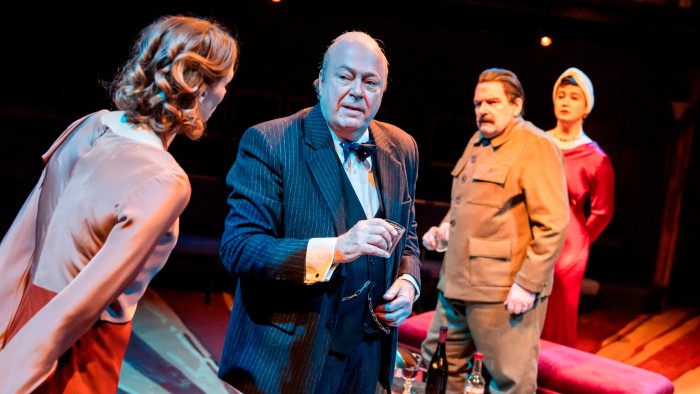Summarize this content to 2000 words in 6 paragraphs in Arabic Unlock the Editor’s Digest for freeRoula Khalaf, Editor of the FT, selects her favourite stories in this weekly newsletter.How wonderful that translators are having a moment in the spotlight. Hot on the heels of Kyoto, in which we see the vital role of grammatical details in forging the Kyoto protocol, comes a cracking new drama from veteran playwright Howard Brenton, whisking us to a crucial meeting in Moscow at the height of the second world war. Leaders Winston Churchill and Joseph Stalin take centre stage — played with witty precision by Roger Allam and Peter Forbes — but at their shoulders are the interpreters, smoothing the path, judiciously losing insults in translation.“Do you expect Russia to bleed to save your wretched little island and its filthy empire, while you do nothing?” bellows Forbes’s Stalin. “He says — our countries must bleed together,” mutters the translator.Churchill in Moscow is a play bubbling with timely insights about trust, truth and the hard art of compromise, alert constantly to the richness of language, its ability to reveal and conceal, and to the complexity of communication. Stalin and Churchill first approach each other like two tomcats on a fence, bristling with distrust. As they speak their native tongues to one another, Brenton mischievously depicts this as gobbledegook, emphasising the mutual suspicion between them. Conversation is circumspect — even the trees are bugged. But it’s 1942, Hitler’s forces are closing in on Stalingrad, Churchill knows there are no plans for an Allied invasion of France until 1943 at the earliest, and both men are under extreme pressure. Each fears the other might cut a deal with the German dictator. They need to find an understanding and find it fast.Through a series of pithy meetings — in the Kremlin, in Stalin’s dacha, in a corridor, in the bathroom at a banquet — Brenton steers us through these tense few days, as the two leaders, diametrically opposed both politically and personally, circle one another. They’re deftly drawn, Allam beautifully eschewing caricature as Churchill to find a smooth, watchful patrician given to flashes of temper and sudden pools of melancholy while Forbes gives Stalin a tremendous physical presence and nerve-shredding volatility, zipping from bonhomie to paranoia in an instant.Their exchanges are freighted with an uneasy awareness of the transitory nature of power while Brenton weaves in deeper reflections on the human cost of imperialism and the murky nature of realpolitik. Ironically, in the end, it’s through a late-night session of drunken, near-wordless charades that the two leaders forge a rough alliance.It’s a chamber play charged with the weight of history — perfect for the intimate Orange Tree, and Tom Littler directs with nimble wit. There are lovely performances from Julius D’Silva as the bluff Commissar Molotov and Alan Cox as the suave British ambassador Archie Clark Kerr. Jo Herbert and Elisabeth Snegir, meanwhile, as the two (fictitious) female interpreters, find their own mutual understanding as they realise the key role they can play.It’s a little overburdened — the role of Stalin’s 16-year-old daughter, Svetlana (Tamara Greatrex), whose individual hopes are poised against the backdrop of the men’s critical powerplay, feels too strategic. But this is a vivid, wise drama that, given current world events, presents significant lessons from history.★★★★☆To March 8, orangetreetheatre.co.uk
rewrite this title in Arabic Churchill in Moscow review — Roger Allam stars in a timely reflection on realpolitik
مقالات ذات صلة
مال واعمال
مواضيع رائجة
النشرة البريدية
اشترك للحصول على اخر الأخبار لحظة بلحظة الى بريدك الإلكتروني.
© 2025 جلوب تايم لاين. جميع الحقوق محفوظة.


